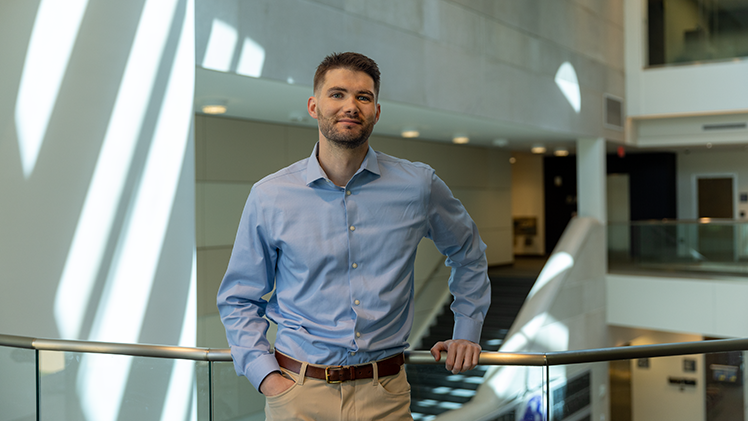For Nicholas Henkel, getting involved in research as an undergraduate zoology student was borne not so much out of enthusiasm for the lab as it was carefully thinking about his next step.
Getting into medical school was the goal, and having research experience would help with his application.

CELEBRATING SUCCESS: UToledo recognizes the Class of 2025 with a series of stories featuring students receiving their degrees at spring commencement.
“You’re checking off a box. Even if you didn’t like research, you gave it the good old college try,” he said. “It shows that you were familiar with the scientific process, because that’s what medicine is.”
Far from not liking it, though, Henkel was enthralled by the work he was doing in neuroscience.
That led to some uncomfortable questions. Did he give up on medicine to become a scientific researcher? Did he ignore the passion research had ignited and stay the course with medicine?
A research internship at the University of Utah between his junior and senior year of college, however, opened his eyes to a third possibility.
“My mentor was an M.D./Ph.D. I really loved how he practiced medicine and how he approached clinical problems,” Henkel said. “He could take clinical questions and was applying them directly in his lab. I thought that was the most amazing thing, and I thought maybe it was something I could do too.”
Henkel found that opportunity at The University of Toledo, which offers a joint M.D./Ph.D. program through the College of Medicine and Life Sciences.
The Cincinnati native completed his doctoral work at UToledo in 2023 and is set to graduate with his medical degree on Friday, May 16, eight years after he enrolled in the College of Medicine.
It’s unquestionably been a long journey, but his efforts have more than paid off.
After graduation, Henkel will depart Toledo for a yearlong internal medicine internship with Harvard Medical School at Massachusetts General Hospital followed by three years of neurology training at the University of California San Francisco, two of the country’s best residency training programs.
“I’m very grateful for the experience that I’ve had at Toledo. There is a lot of opportunity here,” he said. “Some of the things I have done and been able to see is special. I think there’s a really nice blend of pure clinical medicine and academic components too. I’ve had great mentors here and I’ve been supported all the way through.”
One of those mentors was Dr. Coral Matus, an associate professor and associate dean for clinical undergraduate medical education in the College of Medicine and Life Sciences, who worked closely with Henkel both in clinical rotations and when he served as the lead chair of the Independent Student Analysis Committee during the college’s most recent LCME accreditation, which was granted in 2021.
“Nick is one of those students who truly has made the most of every opportunity,” Matus said. “He is so well-prepared both as a clinician and a researcher, and he has really seen the ins and outs of medical education. He is kind, compassionate and very bright, and his patients adore him. His experience is going to set him up for anything he wants to do.”

Nicholas Henkel, who already earned a Ph.D. from UToledo, will graduate with his medical degree on May 16 and begin a prestigious residency in neurology.
Henkel’s path toward medicine — and neurology in particular — was first inspired by his experience as an infant. Born with a rare intracranial dermoid cyst that had to be removed when he was 6 months old, Henkel spent the first several years of his childhood spiking unidentified fevers that often sent him to the hospital.
As he grew older, he knew he wanted to do something so he could help others similar to how he had been helped. High school introduced him to biology, a love of which slowly manifested into his pursuit of medicine.
Henkel’s specific interest in neurology and Alzheimer’s dementia also has been inspired in part by what he’s seen in his own family. During his time at UToledo, all three of his living grandparents succumbed to dementia, including two from Alzheimer’s.
Much of Henkel’s own research at UToledo has been focused on finding new ways to treat that disease.
Henkel’s work, coming under the mentorship of Dr. Robert Smith, professor and chair of the Department of Neurosciences and Psychiatry, has resulted in several important publications and led to him receiving a highly competitive F30 fellowship grant from the National Institute on Aging in 2022.
His research also formed a significant basis of the background work that helped UToledo secure a major, $3.7 million research grant from the National Institute on Aging in 2024 for a new study that casts aside previous assumptions about Alzheimer’s and takes a clean-slate approach to understanding the origins of the disease.
The work, which is being led by Smith, ultimately aims to identify targets for new drugs that can block the progression of cognitive impairment seen in Alzheimer’s disease.
“While it is a very important goal to extend our understanding of the pathophysiology of Alzheimer’s dementia, perhaps a bigger and more important goal is training the next generation of physician-scientists that can blaze the trail to help the afflicted with brain disorders,” Smith said. “Nick is well on his way to being a top leader in his chosen field.”
Henkel said he hopes to eventually work in academic medicine where he can contribute directly to both clinical care and cutting-edge medical research. In the meantime, he’s eager to continue his training.
“It’s going to be a really rigorous and really challenging four years, but I’m looking forward to learning, finding clinical independence and using my clinical interests inform the research work that will come from it,” he said. “I love what I do. I can’t wait to see what the future holds.”